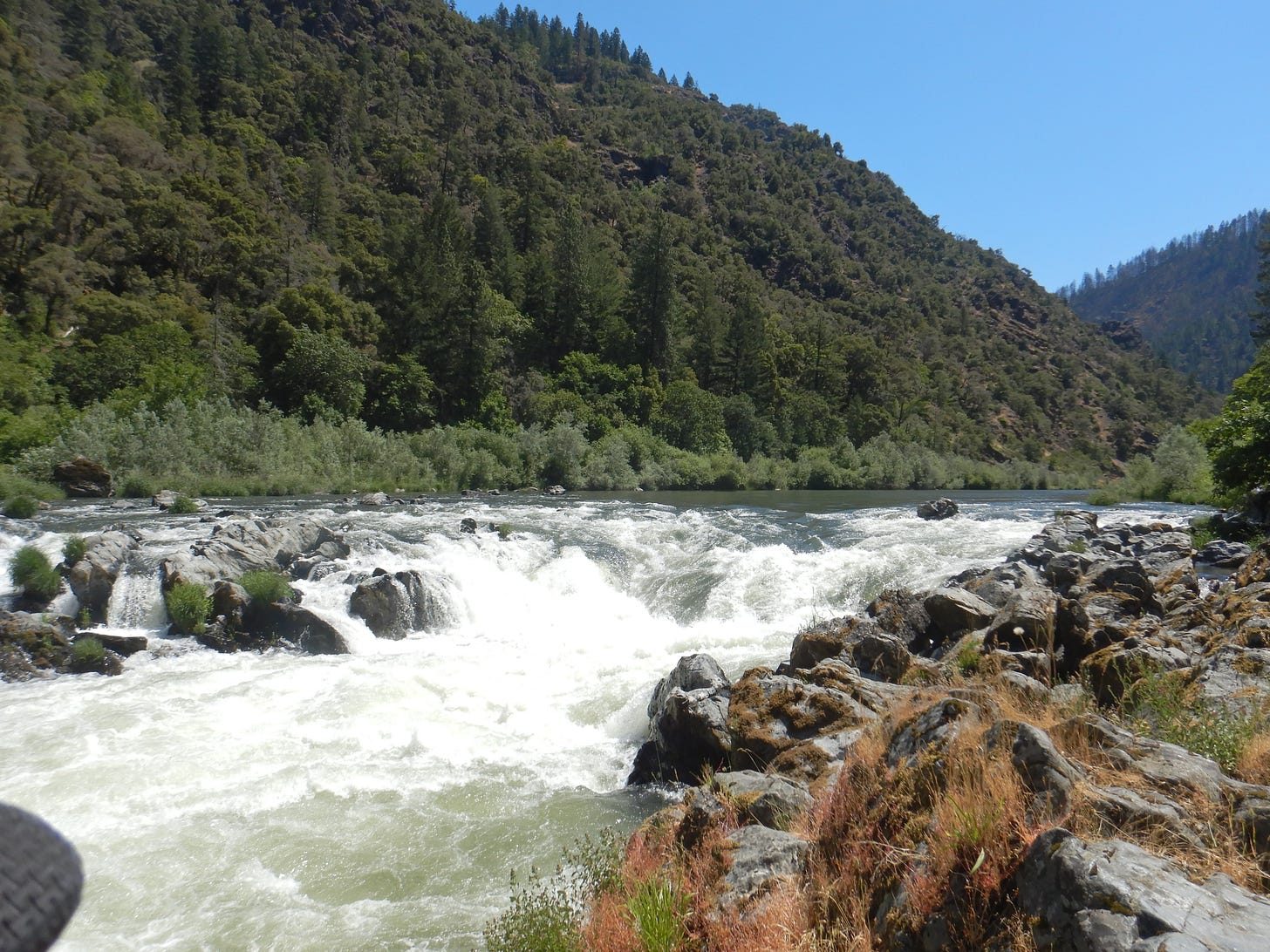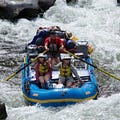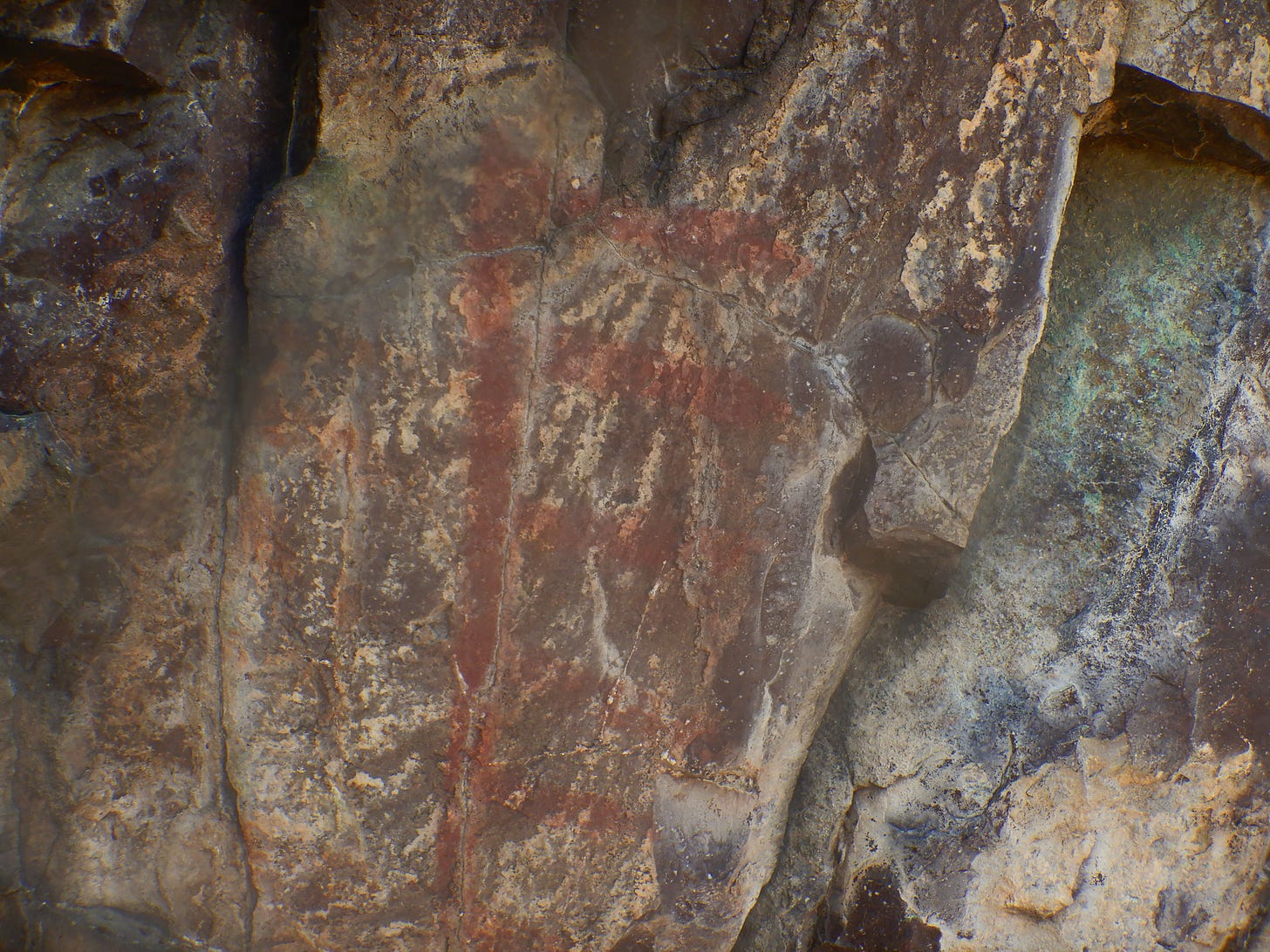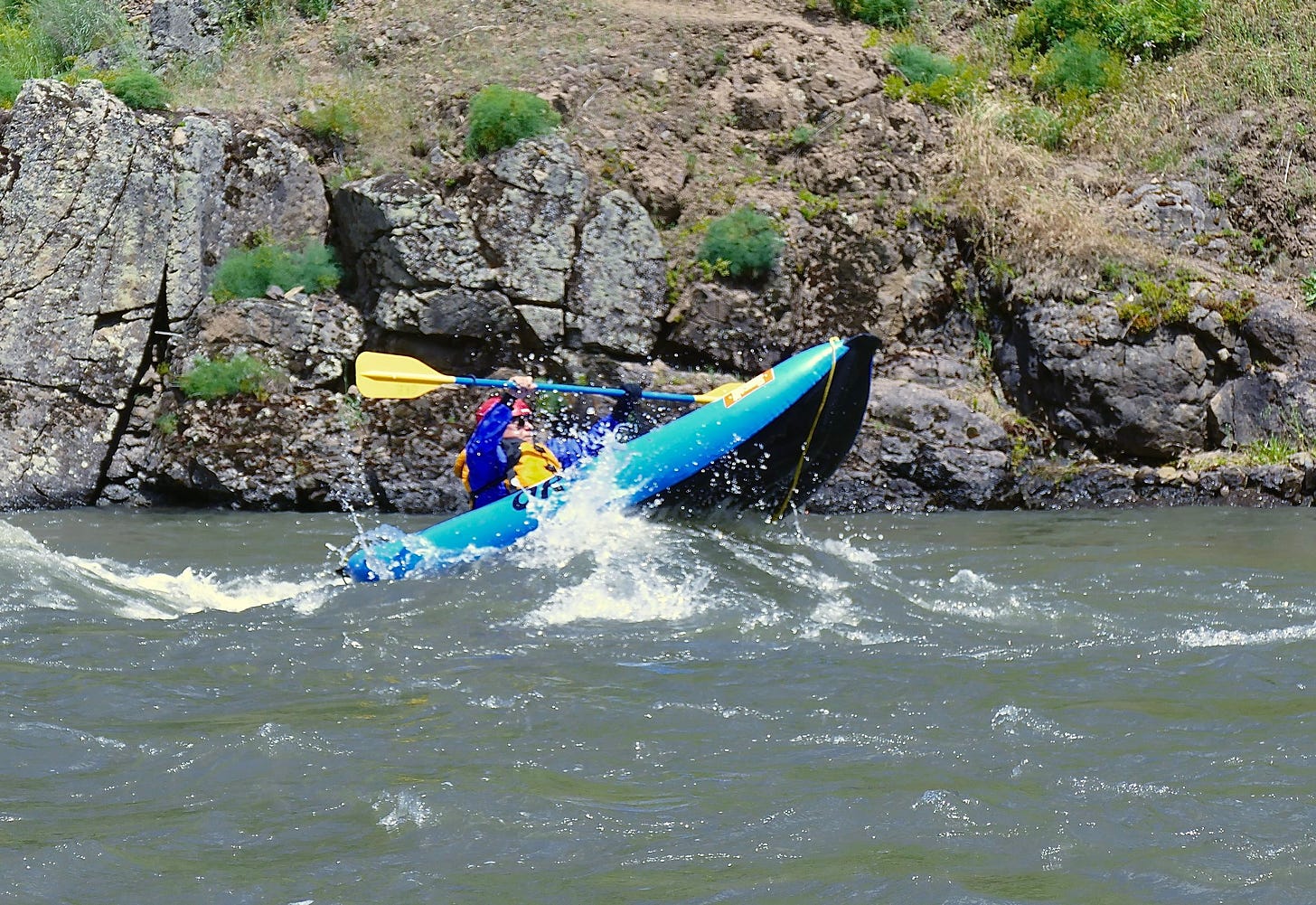"Oh, I Couldn't Do That." Yes, You Could, and Here's Why It's High Time to Sign Up
You're Too Old to Spend the Rest of Your Life on the Couch: Let's Adventure!
You’re sitting in the front of a plunging blue raft, leaning forward to dig your paddle into the turgid waters of a mighty river. Cold water strikes your face as a big wave hurtles over the front of the raft, soaking you and everyone else as you help maneuver your craft through the boiling rapids. Your guide hollers,
“Give me three more!”
And you plunge ahead into the waves.
Undeterred, you grin into the wind, scream with joy and reach forward to grab more water.
Oh, I couldn’t do that.
Bet you could. In fact, I know you could, with rare exception.
Even if you’re chasing down ninety, have strictly limited mobility, have significant disabilities, you could still do that. At the very least you could be in the easy-going “Huck Finn” raft enjoying the ride while others do the paddling.
And by the way, that would be Ted Brownrigg at the oars, above. He’s 73.
Why do we say we can’t do that before we even look at the options?
Why do we believe so fervently that our “inner kid” is long gone, when in truth it’s waiting for us to let them come out and play again?
We so often talk ourselves out of the best things in life because we’re convinced the best times are behind us. Second, even if we were serious athletes in our youth, we so often make the wrong assumption that past fifty, we’re all done.
If I had a plug nickel for every time I heard someone use the knee-jerk response of “too old” to just about anything, I’d own several islands in the Seychelles.
Just for reference, I’m 71, past the point where a great many of us have already thrown in the towel and said we’re done. The way I see it, we could be just getting started, but may just need a gentle entry into the world of adventure for inspiration.

Just what are you and I Too Old for anyway?
I spent a fair chunk of this summer on rafting trips in the Pacific Northwest with Oregon River Experiences (O.R.E.). On widely-varied excursions from one to seven days ranging from Portland’s back door to Idaho’s high desert to southern Oregon, I investigated some of was available for those of us well past what many consider our prime time.
What I found is that prime time is right here, right now.
That includes those of us convinced we just couldn’t do that. In fact I sat in the raft next to a post-sixty woman who said that very thing. Two rapids on the lively Clackamas River later, she was having the time of her life.
All she needed was to take that first step.
I believe you should have that time of your life too, whatever that looks like. I’ve come to admire river rafting as the “gateway drug” to getting out into the wild despite age, ability and mobility issues. The fact that it’s surprisingly accessible is precisely what sold me on the idea.
This article reveals a few of the treasures I found. Consider it a serious invitation to come play, play hard, without having it be anywhere near as hard as many think it is.
You’re not too old for the adventure. You’re too old to tell yourself you’re too old for a new adventure.
Perhaps the biggest takeaway for me was that river rafting, with the exception of running big Class V rapids which are just too dangerous, really can be for just about everyone at any age. Kids under six, and certain folks with severe disabilities- a conversation to have with the outfitter before you self-select out- aren’t a fit, but that still leaves a broad swath of the rest of us.
Back in 2014 and 2015, I did two rafting trips with zero knowledge and preparation. The first was a Class III in Costa Rica, the second was one very hairy day trip on the Class V headwaters of the Nile in Jinja, Uganda.
I didn’t seek the sport out again until the opportunity presented itself this summer. ORE is in Portland, a quick drive north. Their reach is all over the state and beyond, not only on the rivers but also winter sports on nearby Mt. Hood and surrounds.
What I liked about ORE was its coverage, the broad variety of rivers they run and how close-in so many of the adventures would be. I also like that it’s a small operation. Once you get to know the guides, if you like and trust them, then you have a solid partner for your outdoor adventures in all seasons- no matter your age.
ORE has a forty-year history of guiding people along the rivers in the Pacific Northwest. They specialize in the older adult, particularly older adults who enjoy multi-generational experiences with family members. For those familiar with Road Scholar, ORE runs some twenty-four unique trips a year for them.
For those of us past fifty and beyond, softer adventures like rafting and gentle winter excursions allow us to take easy steps back into the rich fun of the outdoors without having to train for months or feel overwhelmed. Especially if you time your rafting for later in the year when spring runoff has died down, you can have a gentle ride for most of the journey.
If your impression of rafting is based on the carefully-curated extreme videos used to impress, no wonder you might think this isn’t for you.
What you’re missing is plenty of time on quiet waters, as below. You’re easing along slowly enough to see bald eagles and osprey, otter, deer, possibly a bear or two, fish jumping, and the great immersion into the quiet, far away from the invasion of notifications.
Once you have lunch or dinner- a treat because guides really can cook- you’re free to wander, swim if safe, nap, read, talk or just….be.

I did two multi-generational trips with ORE so was able to see how families fared. Mostly, I wanted to experience the guides, for the guides make the trip. That’s what Road Scholar is looking for; people will always come back when the guides are terrific, and an older cohort requires a very specific kind of guide and attention to their needs.
Before I set out on my first river rafting trip since 2015, I spoke to some folks who had spent a lot of time on the river with ORE over the years. I wondered what it was that kept them coming back, especially as some of them well past sixty.
I particularly appreciated comments from a woman who has spent half her lifetime with at least a week a year on America’s great rivers.
Sheree Stewart, now 65, has spent thirty years as the geologist/environmental scientist on the Salmon River. She provided the education and enrichment which makes up the “scholar” part of the Road Scholar adventure. Sheree now lives in New Mexico, is still very active in the outdoors, and remembers her years on the rivers with joy.
“It was once a year, my vacation,” Sheree said. “Of all the river trips I did I loved the Salmon the best. It’s a geologist’s dream.” It’s also the perfect place to teach earth sciences as well as history as the river reveals our continent’s evolution. Sheree’s intense love of the river and the outdoors were fed at the same time she was feeding people’s minds.
Sheree’s watched the world change and with it, the kind of people who head out for a week on the river. While previously, more people came for the education and exploration, Sheree explained, “These days people want to talk about their problems.”
That’s perfectly understandable. While some may not be as drawn to understand the great heaves of stone which tell the story of the river’s making, they are still drawn to Nature. That healing takes place at such a deep and organic level it might not be obvious for a while.

By the time I drove down to the tiny town of Galice, Oregon, for my first trip in June on the magnificent Rogue River, I was dealing with some of the same questions and discomforts that many might feel.
The Rogue is cold in June. Rafting isn’t my primary sport, I fear drowning above all, and especially fear cold water. What was I thinking?
That this was precisely what I needed.
As we inch our way into our later years, too many of us make unfair assumptions about what we can do without even trying. That shuts the door on so many possibilities. I’ve learned- and kindly this isn’t for everyone - to develop a different knee-jerk response to “I couldn’t do that.”
That’s precisely when it’s time to sign up to do that.
It took mere minutes after Reid, our guide, pushed us off into the waters from Alameda Campground near Galice before I realized how comfortable, how safe I was, and how silly my fears had been.
It isn’t just that the Rogue is one of the most breathtaking rivers in the country, if not the world.
It’s that we’re giving ourselves this gift of that experience, no matter how old we are or the stories we tell ourselves that it’s too late. Beauty like this is never too late. In fact, it’s even more essential, the older we get.
Reid regaled us with fabulously fake “factoids” about carnivorous ducks, having a great time having us on. All of us relaxed into the flow of the river. Once past the first rapids, then the next, all I could think was…
…why on earth did it take me so long to do this?
For those still terrified at the prospect, and who think that the only people who run the river are hard-core athletes and outdoors people, this:
First, if all you want to do is sit and watch the wilderness slip by, then that’s all you have to do. That’s enough.
Second, if you want to be all in, you can sit up front, brave the waves, paddle like mad and enjoy getting wet the way tourists like to sit ringside at big aquatic shows. That’s also enough.

Over the course of the three trips I watched experienced folks in their seventies swiftly show up to help with the constant demand of moving heavy goods on and off the boat, set up campsites and help others who needed it.
I watched inexperienced older folks, only accustomed to high-end glamping, learn to accommodate life on the river. They enjoyed the beauty of the wilderness and took deep pleasure in watching two sets of grandkids have fun and play hard in and on the water.
Some of those grandfolks played just as hard in and on the water, more than they thought they might. Nature invites our child out, even if that child hasn’t played in decades.
While ORE asks that guests help with unloading and setting up, sometimes you can’t. That’s also enough. If you need help setting up your tent, or getting up to a lodge for a lodge-to-lodge experience, that’s okay, too.
The point is to make sure you and I get the experience of the river and all she has to offer. That’s what makes a trip with guides who regularly work with older people so much better. When you help out, you feel like you’re really part of the experience.
That said, what about an out-of-boat experience? What if you or I land in the river?
You follow the instructions from your pre-trip safety briefing, stay calm, point your feet down river, do what the guide tells you to do. You’ll be fine. I watched it happen a number of times with both grandparents and grandkids.
A dunk in the drink had the interesting effect of helping people feel braver and more confident, as they learned to trust the guides as well as their own ability to master their fears.
The river is a great teacher. All we need to do is show up. Just like in life.
At all times, the crew is minding the safety of the river conditions, where the kids are (or shouldn’t be), and staying ready at any moment to launch themselves for a rescue. They put in from fourteen to sixteen hours a day ensuring that our special dietary needs are met, that we are sucking the marrow out of every moment, and above all, we’re safe.
Is this for you?
One group of sixty-something Portland-based pickleball players decided to celebrate a birthday by booking a day ride on the Clackamas River, barely an hour out of the city. That’s a perfect way to dip a toe in the experience without going all-in.
Many city folks have no clue that such an adventure- a complete immersion in the Oregon wild- is available effectively right out their back door. Not only that, you can book a half-day if you can’t swing a full day, or don’t quite trust yourself. It’s remarkably affordable.
Seeing how ORE’s staff worked with people of an age, watching how those people gained confidence and discovered a new sense of joy on the rapids convinced me.
This is not a sport just for the super athletic. One of my favorite stories from Rylin, our lead guide for the Rogue trip, was of “six spherical women” who were rowing in perfect symmetry down the river. She was in awe of how well they rowed as a team. Not only was that a delightful thought, these women clearly understood the need for smooth teamwork. The story underscores my point.
So very many people can do this. Likely you can, too.
For people who want a gentle float, or serious jolt, both and much more can be had. Perhaps what I loved best was watching all kinds of folks, some with significant disabilities and several close to ninety, thoroughly enjoy themselves in Oregon’s wilds.
Soon enough, the snows will drape the countryside. Already I’m planning to do a few easy snowshoe trips and learn how to cross-country ski, something I’ve not tried in decades. ORE has guides our age who can help us do that, too.
This is an invitation to return to that part of you that aches for something different. This is a sport that is remarkably kind to those of an age, and is a wonderful way to either experience the outdoors for the first time, or return to something you love that you might believe is out of reach.
Whatever age you may be, perhaps it’s time to sign up for a half-day or day, just to see what it’s like. I like it so much I’m going back next year.
We don’t stop playing as we get old. We get old when we stop playing.”- Bertrand Russell.
Let’s play.
Thanks for reading. I hope you’re inspired. Many of you have commented that you couldn’t do this, this article is for you.
People like you,
, who used to be a rafting guide, this is for you, too.I see all of us who are too fond of our chairs. Let’s go sit in a raft and be reminded that life isn’t lived on a screen. See you on the river.
If this inspired you please consider:
If you know someone who might value a friendly nudge to get out into the wild again, please also consider










Good for you! I did a rafting trip with friends when I was about 38 (now almost 80). It was Brown's Canyon on the Colorado River when I lived in Denver. For the record, I would NEVER do that again. I was terrified the entire time. The water level was low that year and the river was fast. Totally cured me of "adventuring."
Julia, you can't help yourself -- you are, in fact, a walking inspiration. You make me want to call my friend in Montana who guides a lot of summer river trips and ask him "what time should I be there?"
Today I'll settle for a long hike through a craggy Texas woods where I'm sure to delight in growing things and small critters.
I'm grateful that you document your adventures and reflections -- a great combo. Big hugs, ~Stephanie